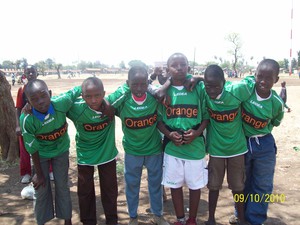Africa: Age Cheating in Youth Championships Continues Unabated
By Robert Obell
 NAIROBI----When Orange Kenya about two weeks ago launched a noble corporate-responsibility initiative- a soccer tournament for children in Nairobi’s primary schools aged 13 and below there were high expectations.
NAIROBI----When Orange Kenya about two weeks ago launched a noble corporate-responsibility initiative- a soccer tournament for children in Nairobi’s primary schools aged 13 and below there were high expectations.
The launch, attended by among other dignitaries Kenya’s Sports minister Hon. Dr. Paul Otuoma, was punctuated with pomp and optimism.
Unbeknown to many, what has become Africa’s curse and shame in youth championships was waiting on the wings. As the tournament proceeded, it became clear that the age-limit factor may prove to be the tournament’s proverbial Achilles heel.
The Orange Mabingwa Under-13 Football Challenge, as the tournament has been dubbed, is already being rocked by an age-cheating fiasco that that has bedeviled most of youth championships in Africa.
During the launch ceremony, speaker after speaker commended the integrated communications provider for such a worthy initiative that would tap into Kenya’s budding talents. Orange Chief Executive Officer Mickael Ghossein was especially upbeat about the ramifications the tournament would have on the participants.
“The Orange brand is associated with warmth, fun and celebration”, he said. “And these are the values that we are coming out to share with the pupils who will participate in the tournament.” And while the values might have been the spur of the tournament, the age-limit factor might be the scar.
When we visited Makongeni Sports ground in Makadara Constituency the air was palpably rife with disgruntled voices over the perceived over-age of some players.
One team that caused a fair share of tension was Moi Airbase Primary School whose players looked older than 13, not from their birth certificates but from their gigantic size.
The team would afterwards line up for inspection only for some of their players to be ruled out as being over-age. The team would thus be forced to play with 8 players instead of the conventional 11.
According to the officials, most of whom were Kenya Premier League’s (KPL), a birth certificate or any other document was unnecessary.
FIFA came up with a medical test that seems to scientifically ascertain a player’s age. This is the Magnetic Resonance Imaging (MRI) that uses a magnetic field and pulses of radioactive energy to create images of organs and bone structure.
Unfortunately, this medical test works best for under seventeen championships and not under 13 tournaments as it evaluates age from the degree of fusion of the bones in the wrist, which only completely comes together at around age 20 in human beings.
This leaves such age-sensitive tournaments such as those started by Orange Kenya to rely on traditional methods such as verification of birth certificates as the only proof of a player’s age.
Moi Airbase Primary School’s coach Muhammad Ali, for example, says that officials turned down all the documents that attested to his players’ age because they did not look authentic. This, says Ali, is not true. He instead reads foul play and sheer discrimination.
“They have called us walalo (a kind of derogatory slang for illegal Somali immigrants in Kenya).” A visibly agitated Ali said. “It has nothing to do with age-cheating, this is purely discrimination.”
But the officials disagree with Ali. One of them, who introduced himself only as Richard, says that though age-cheating has almost been a norm in Africa, they are taking decisive steps to stamp it out.
Ali’s team, he says, was not discriminated against. “We did what any other official would have done.”
Age-cheating in youth championships has a long history in Kenya’s sports in particular, and Africa’s in general.
In 2003, Kenya’s then Sports Minister, Najib Balala disbanded all the Kenyan International teams after it emerged that at least two of the players of the under 17 team had cheated about their age.
It all began with the team (Kenya’s Under 17) eliminating one of the Championships favourite and two times winners Ghana in the last round of qualifiers. Ghanaians cried foul, complaining about the age of the Kenyan players.
Ironically, two teams that have been on the receiving end for age-cheating in youth championships in Africa are Nigeria and Ghana.
Some soccer commentators have argued that it is not the way of an African to go about counting his age. As such, they have reasoned, Africans do not lie aboutt their ages deliberately.
That is why MRI technology has been long overdue. And while some in the soccer world have heaved a sigh of relief, age-cheating debacle is far from over.
Not only is the technology unable to ascertain the ages for those who are age 13 and below, it is also not entirely foolproof.
FIFA’s president, Sepp Blatter, responding to questions raised by BBC readers, admitted that indeed the technology was not without fault.
Noting that the solution to age-cheating lay with national associations, he cautioned against religiously believing on such medical tests as MRI.
“There is a two year margin of error which does not make it an effective test at the moment,” he said but warned that FIFA will not stand for cheating as that goes against all that is good in football.
Nonetheless, FIFA will have to come up with a medical test that will give Mohammed’s boys a fair judgment- a system that bars them from the field of play not because they look older, but because they are older.



